Sleep apnea is a prevalent sleep disorder affecting millions of people worldwide. Individuals with sleep apnea experience stoppage in breathing or shallow breaths during sleep, leading to disrupted sleep patterns and potentially severe health consequences. While continuous positive airway pressure (CPAP) therapy is the gold standard treatment for sleep apnea, choosing a best pillow for sleep apnea can also play a significant role in managing symptoms and improving sleep quality.
Understanding the sleep apnea
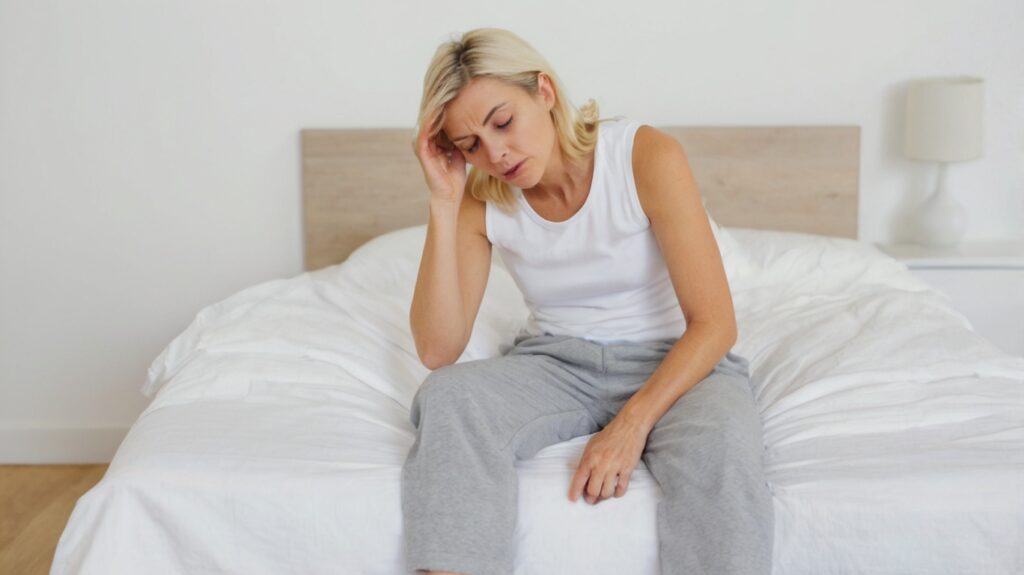
Sleep apnea manifests in two primary forms: obstructive sleep apnea (OSA) and central sleep apnea (CSA). OSA occurs when the throat muscles relax, causing a blockage in the airway, while CSA involves the brain failing to send signals to the muscles responsible for breathing. Common symptoms of sleep apnea include loud snoring, gasping for air during sleep, morning headaches, and daytime fatigue
Impact of Pillow on Sleep Quality
The importance of best pillow for sleep apnea cannot be ignore for individuals with sleep apnea. A pillow that provides adequate support and maintains proper head and neck alignment is essential for keeping the airway open and reducing the risk of breathing obstructions during sleep. Using an unsuitable pillow can lead to poor sleep posture, increased snoring, and post sleep apnea symptoms.
Key Features to Look in choosing the best Pillow for sleep apnea
When selecting a best pillow for sleep apnea, several features should be considere
Supportive Material
Memory foam and latex pillows are highly recommended for individuals with sleep apnea due to their ability to conform to the shape of the head and neck, providing optimal support and alignment.
Adjustable Loft and Firmness Levels
A pillow with customizable loft and firmness settings allows users to tailor the height and support level to their individual preferences and sleep positions, ensuring maximum comfort and effectiveness.
Breathability and Hypoallergenic Properties
Pillows with breathable fabrics and hypoallergenic materials help promote airflow and reduce the risk of allergens that can trigger nasal congestion and breathing difficulties which are the common issues for sleep apnea sufferers.
Top Picks: Best Pillow for Sleep Apnea
1. Contour Memory Foam Pillow
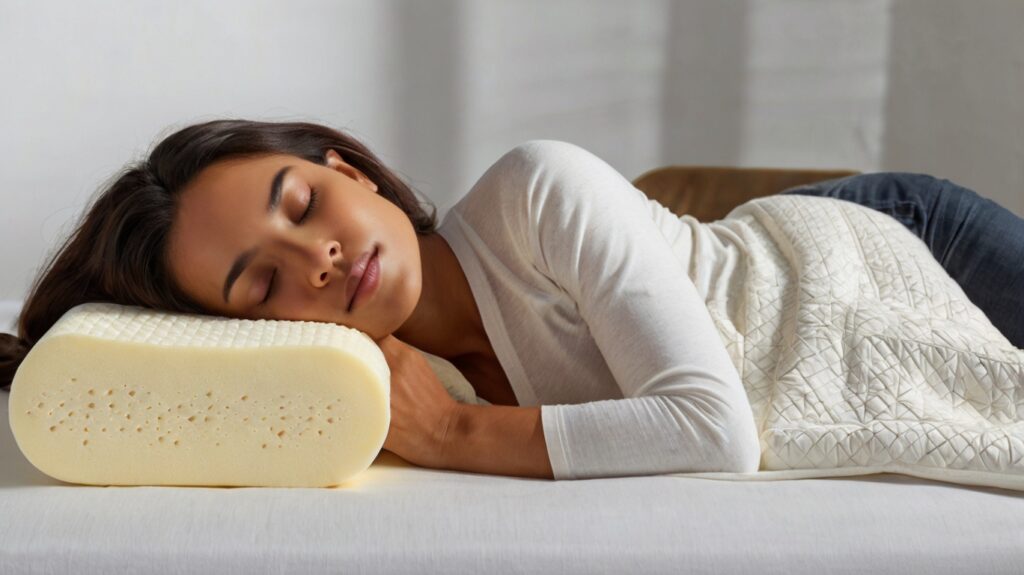
Made of high-density memory foam, this contoured pillow is designed to provide optimal support for the head and neck, promoting proper spinal alignment and reducing pressure points. Its specific design helps keep the airway open, making it an excellent choice for individuals with sleep apnea.
Benefits:
- Optimal Head and Neck Alignment: A contour memory foam pillow is designed with curves that follow the natural shape of your head and neck. This design helps maintain proper alignment of the airway, reducing the likelihood of obstructions that cause sleep apnea episodes.
- Improved Breathing: By keeping the head and neck in an optimal position, a contour pillow can help keep the airways open, facilitating better airflow. This is particularly beneficial for individuals who suffer from OSA as it can reduce the frequency and severity of breathing interruptions.
- Reduced Snoring: Snoring frequently accompanies sleep apnea. The supportive nature of contour memory foam pillows can help reduce snoring by promoting better alignment and preventing the throat tissues from collapsing and causing airway obstructions.
- Pressure Relief: Memory foam adapts to the shape of your body, providing customized support and relieving pressure points. This can lead to more comfortable sleep and reduce the restlessness that can exacerbate sleep apnea symptoms.
- Enhanced Comfort: The ergonomic design of contour memory foam pillows offers superior comfort, which can lead to improved sleep quality. Better sleep quality can help mitigate the negative effects of sleep apnea, such as daytime fatigue and cognitive impairment.
2. Adjustable Latex Pillow
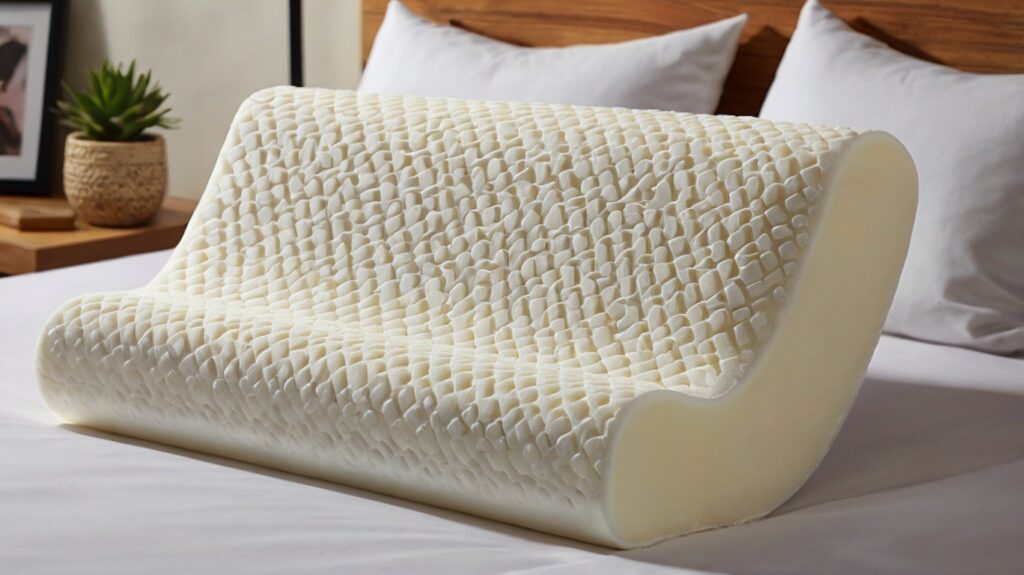
Featuring a unique blend of natural latex and synthetic materials, this pillow offers customizable firmness levels and excellent breathability. Its hypoallergenic properties make it suitable for allergy-prone individuals, while its adjustable design ensures a personalized sleeping experience.
Benefits:
- Customizable Support: The key advantage of an adjustable latex pillow is its ability to provide customizable support. The pillow’s height and firmness can be adjusted by adding or removing latex fill, allowing users to achieve an optimal alignment of the head, neck, and spine. Proper alignment helps maintain an open airway, which is crucial for reducing the symptoms of obstructive sleep apnea.
- Enhanced Airway Alignment: Latex pillows offer a supportive yet pliable surface that contours to the shape of the head and neck. By adjusting the fill to the desired level, users can ensure that their head and neck are positioned in a way that keeps the airway open, reducing the risk of airway obstruction and improving breathing.
- Pressure Relief: Latex is known for its resilience and ability to distribute weight evenly. This pressure-relieving property can help reduce discomfort and restlessness, which might otherwise exacerbate sleep apnea symptoms. Improved comfort and support lead to better sleep quality, which is beneficial for those managing sleep apnea.
- Breathable Material: Latex pillows are naturally breathable and resistant to dust mites and allergens. This breathability helps maintain a cool sleeping environment, which can be advantageous for people with sleep apnea who might experience discomfort or overheating during the night.
- Durability and Support: Latex is a durable material that maintains its shape over time. Unlike some other materials that may compress or lose support, an adjustable latex pillow provides consistent support, which is essential for maintaining proper sleep posture and reducing symptoms of sleep apnea.
3. Wedge Pillow

Ideal for individuals with positional sleep apnea or those who experience frequent snoring, this wedge-shaped pillow elevates the upper body to reduce snoring and alleviate symptoms of sleep apnea. Its gentle incline promotes better breathing alignment and can provide relief for individuals with mild to moderate sleep apnea.
Benefits:
- Improved Airway Positioning: A wedge pillow is designed to elevate the upper body, which can help keep the airway open by preventing the collapse of the throat muscles. Elevating the head and torso can reduce the likelihood of airway obstruction during sleep, making it a useful tool for managing obstructive sleep apnea.
- Reduced Acid Reflux: Many people with sleep apnea also suffer from gastroesophageal reflux disease (GERD), which can exacerbate sleep apnea symptoms. By elevating the upper body, a wedge pillow can help reduce acid reflux, which in turn may decrease the frequency of sleep apnea episodes caused by reflux-related airway irritation.
- Enhanced Breathing: The elevation provided by a wedge pillow promotes better breathing by encouraging a more open airway. This position can facilitate easier airflow and reduce snoring, a common symptom associated with sleep apnea.
- Comfort and Pressure Relief: Wedge pillows often come with a firm yet comfortable surface that helps to relieve pressure on the back and shoulders. This can lead to more restful sleep, reducing discomfort that might otherwise worsen sleep apnea symptoms.
- Versatility: Wedge pillows can be used in various sleeping positions and can be especially beneficial for back sleepers. They can also be adjusted for different angles of elevation, allowing users to find the most effective position for their specific needs.
Tips for Using the Pillow Effectively
To maximize the benefits of a specialized pillow for sleep apnea, consider the following tips:
Position the pillow to ensure proper alignment of the head, neck and spine, keeping the airway open and reducing the risk of breathing obstructions.
Experiment with different pillow heights and firmness levels to find the most comfortable and effective configuration for your sleep preferences and habits.
Regularly clean and maintain the pillow to prevent the buildup of dust mites, allergens and bacteria, which can increase sleep apnea symptoms and affect overall sleep quality.
Consult with a healthcare professional
Before selecting the best pillow for sleep apnea, it’s crucial to consult with a healthcare professional, particularly if you have severe sleep apnea or other underlying medical conditions. A doctor or sleep specialist can provide valuable insights into your specific sleep needs and recommend the most appropriate treatment options. They can also offer guidance on whether a particular type of pillow is suitable for your individual circumstances and how it may complement your existing treatment plan. Consulting with a healthcare professional ensures that you make informed decisions about managing your sleep apnea and prioritizing your overall sleep health.
Tips for Getting Better Rest with Sleep Apnea
Maintain a Consistent Sleep Schedule: Establishing a regular sleep schedule helps regulate your body’s internal clock, making it easier to fall asleep and wake up refreshed. Aim for consistent bedtime and wake-up times, even on weekends, to optimize your sleep quality.
Create a Relaxing Sleep Environment: Design your bedroom to promote relaxation and restful sleep. Keep the room cool, dark, quiet and invest in blackout curtains or white noise machines if necessary. Limit exposure to screens and stimulating activities before bedtime to signal to your body that it’s time to wind down.
Practice Good Sleep Hygiene: Adopting healthy sleep habits can improve your overall sleep quality. Avoid caffeine, nicotine and heavy meals close to bedtime as they can interfere with your ability to fall asleep and stay asleep. Engage in calming activities such as reading or gentle stretching to help prepare your body and mind for sleep.
Sleep on Your Side: Sleeping on your back can increase sleep apnea symptoms by causing the tongue and soft tissues to collapse into the airway. Try sleeping on your side instead, which can help keep the airway open and reduce snoring and breathing obstructions.
Use Additional Sleep Aids if Needed: In addition to a supportive pillow, consider using other sleep aids that may help alleviate sleep apnea symptoms. Nasal strips, saline nasal sprays and oral appliances prescribed by a healthcare professional are options worth exploring to improve airflow and reduce snoring.
Maintain a Healthy Lifestyle: Adopting a healthy lifestyle can positively impact sleep apnea symptoms and overall well-being. Aim for regular exercise, maintain a healthy weight and avoid excessive alcohol consumption, particularly close to bedtime as it can relax the throat muscles and worsen breathing obstructions during sleep.
Monitor Your Sleep Patterns: Keep track of your sleep patterns and symptoms to identify any patterns or triggers that may cause sleep apnea. This information can be valuable for adjusting your treatment plan and making informed decisions about managing your condition effectively.
To maintain the overall sleep quality and get rid of the neck pain and headache due to wrong pillow selection you can read another great article here.
Conclusion
Choosing the best pillow for sleep apnea is essential for managing and improving overall sleep quality. By selecting a pillow with supportive features, proper alignment, and breathability, individuals can reduce snoring, alleviate breathing obstructions and enjoy a more restful night’s sleep. Prioritizing sleep health is crucial for managing sleep apnea and promoting overall well-being.
FAQs
How do I know about the best pillow for sleep apnea?
Look for pillows specifically designed to promote proper alignment of the head and neck, such as memory foam or latex pillows with contoured shapes.
Can a pillow alone cure sleep apnea?
While a supportive pillow can help manage symptoms, it is not a substitute for medical treatment. Consult a healthcare professional for personalized advice and treatment options.
Is it necessary to consult a doctor before choosing a pillow for sleep apnea?
It’s advisable to consult a healthcare provider, especially if you have severe sleep apnea or other underlying medical conditions to ensure the pillow is compatible with your treatment plan.
Are there any lifestyle changes that can help alleviate sleep apnea symptoms in addition to using a specialized pillow?
Yes, lifestyle modifications such as maintaining a healthy weight, avoiding alcohol and sedatives before bedtime and sleeping on your side instead of your back can complement the use of a specialized pillow for sleep apnea.
Can children with sleep apnea benefit from using specific pillows?
Children with sleep apnea should be evaluated by a pediatrician or sleep specialist to determine the most appropriate treatment options. In some cases, specialized pillows designed for pediatric use may be recommended.

I am a scientific researcher, passionate about the science of comfort. On this blog, I share comprehensive information about pillows, combining my expertise and research to help you find the perfect pillow for your needs.
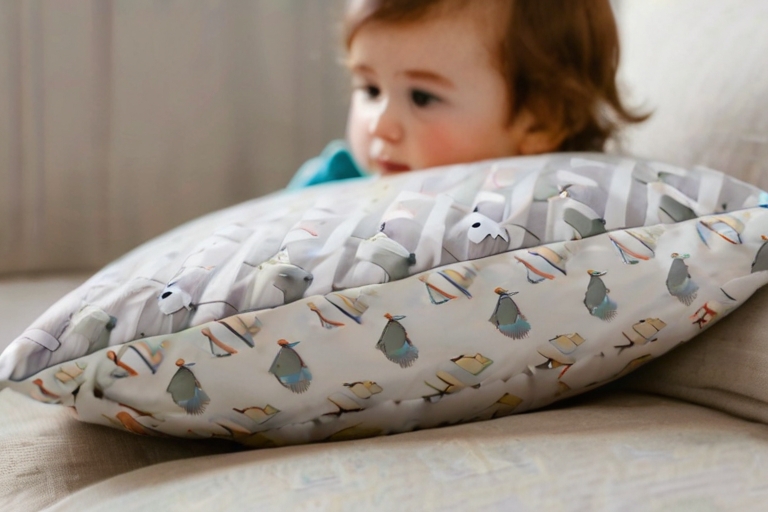
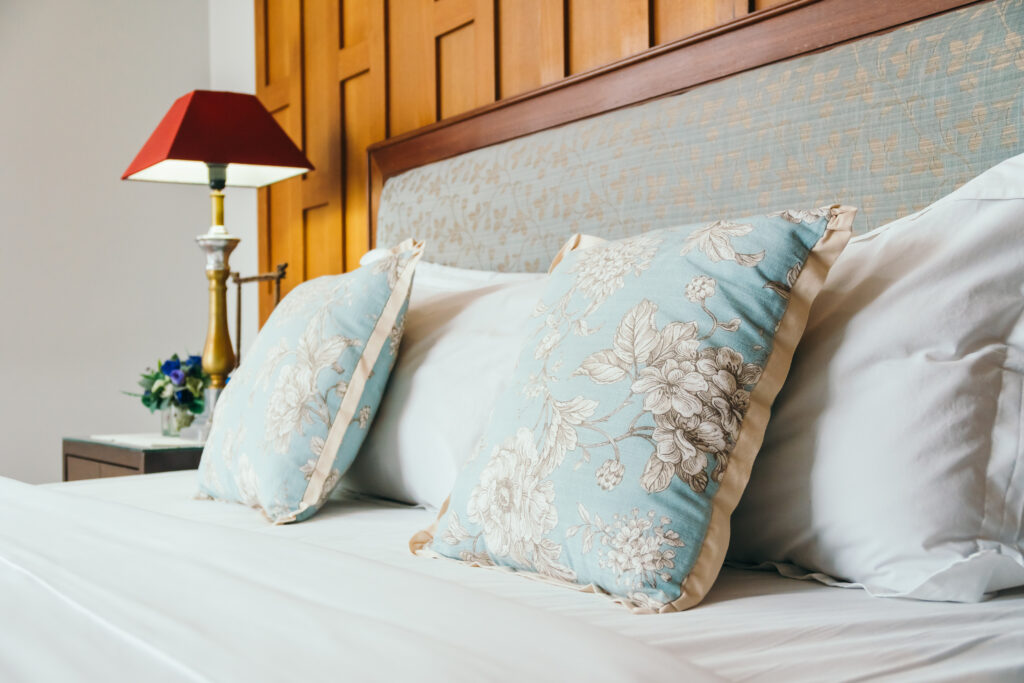
Pingback: 5 hidden Dangers of Deep Sleep Pillow Sprays